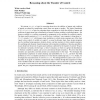Free Online Productivity Tools
i2Speak
i2Symbol
i2OCR
iTex2Img
iWeb2Print
iWeb2Shot
i2Type
iPdf2Split
iPdf2Merge
i2Bopomofo
i2Arabic
i2Style
i2Image
i2PDF
iLatex2Rtf
Sci2ools
137
click to vote
JAIR
2010
2010
Reasoning About the Transfer of Control
We present DCL-PC: a logic for reasoning about how the abilities of agents and coalitions of agents are altered by transferring control from one agent to another. The logical foundation of DCL-PC is CL-PC, a logic for reasoning about cooperation in which the abilities of agents and coalitions of agents stem from a distribution of atomic Boolean variables to individual agents – the choices available to a coalition correspond to assignments to the variables the coalition controls. The basic modal constructs of CL-PC are of the form ‘coalition C can cooperate to bring about ϕ’. DCL-PC extends CL-PC with dynamic logic modalities in which atomic programs are of the form ‘agent i gives control of variable p to agent j’; as usual in dynamic logic, these atomic programs may be combined using sequence, iteration, choice, and test operators to form complex programs. By combining such dynamic transfer programs with cooperation modalities, it becomes possible to reason about how the po...
Coalition | Dynamic Logic | JAIR 2010 | Logic |
Related Content
| Added | 28 Jan 2011 |
| Updated | 28 Jan 2011 |
| Type | Journal |
| Year | 2010 |
| Where | JAIR |
| Authors | Wiebe van der Hoek, Dirk Walther, Michael Wooldridge |
Comments (0)

